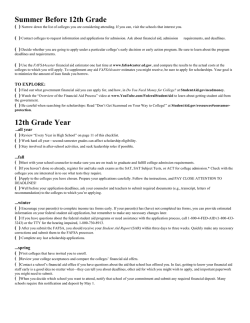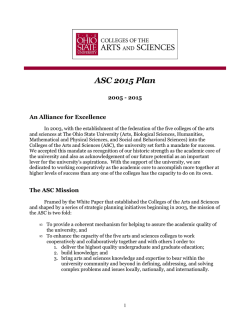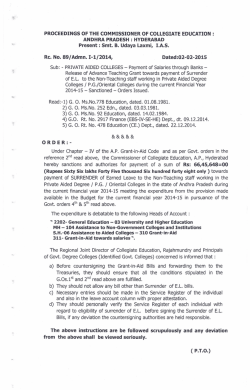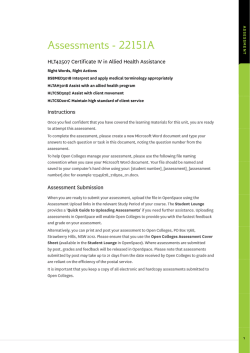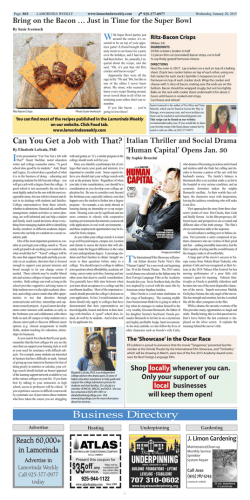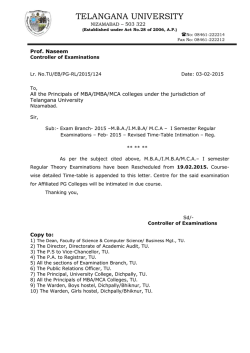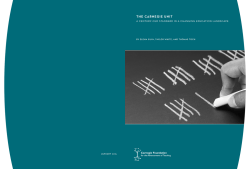
Engagement Matters Volume 12 Issue 1
VOLUM E 1 2 , I S SU E 1 CCCSE Center for Community College Student Engagement W W W. C C C S E . O R G J A N UA R Y 2 0 1 5 ENGAGEMENT MATTERS D I R EC T O R ’ S NOTE It has been eight months since I took the helm as the director of the Center, and things are off to a good start. As we welcome the New Year and prepare for the months ahead, I want to provide a preview of what you can expect from the Center this spring: • Thanks to generous supplemental funding from The Kresge and Greater Texas Foundations, Center staff will conduct focus groups at five community colleges and five baccalaureate institutions. This work will allow us to capture the Latino student voice on the topics of engagement and transfer. • The Center is piloting the Survey of Online Student Engagement (SOSE) with several colleges to students enrolled solely in online classes, and we look forward to gathering information about this group’s engagement. • In early March, the Center will release a report that analyzes the changes in CCSSE data over the last decade. It may be the best contribution we have provided to the field yet! What we know for sure is that your good work is making a difference. It was a busy fall at the Center, and the spring will be no different. As many of you attend conferences, I hope to see you at one of the Center sessions. I welcome the opportunity to meet you and learn how your college is using Center data to improve student outcomes. See you on the road! LISTEN UP Center project aims to help colleges address challenges students face to improve financial services Page 2 Coming Soon: Special Report on a Decade of Student Engagement Data The Community College Survey of Student Engagement (CCSSE) was developed as a tool to provide colleges a data-informed picture of their institution, and by doing so, to help them assess the quality of their work, grow successful educational practices, and identify areas in which to improve. The Center has undertaken and accomplished much work over the last decade to augment CCSSE results and their usefulness to member colleges, but the survey instrument itself has remained unchanged. Because of this, Center staff has recently had the opportunity to take stock of over 10 years of CCSSE data composed of nearly 2 million student respondents from almost 900 community colleges—and we are enthusiastic about what we have found. While we know that colleges across the country are improving their students’ levels of engagement and opportunities for success through focused and intentional efforts, the longitudinal review of CCSSE data has confirmed that improvements in engagement are also observable at the national level. In March, the Center will release a special report focused on this look back, highlighting areas in which engagement has increased the most, paying special attention to the student groups reporting the largest levels of change. This report is a review of the past, but it will also be a pivot to the future. As a global assessment of the work we have all undertaken over the last decade, it will help us determine where we can grow successful practice as well as identify areas in which there is still room for improvement. Center Director Evelyn Waiwaiole and staff will host a webinar about the report shortly after it is released. More details are coming soon. Tools for Working With High-Impact Practices To help colleges work with and strengthen high-impact practices on their campuses, the Center offers the following tools and resources (www.ccsse.org/center/initiatives/highimpact/tools): • Focus Group Manual and Protocols • Community College Institutional Survey and Discussion Guide • Design Principles for Effective Practice • Campus Discussion Guide “The Center’s newest report on high-impact practices, A Matter of Degrees: Practices to Pathways, was very impressive. I specifically liked the layout of the charts and the use of odds ratios to emphasize the results. I have been preparing, analyzing, and reporting on CCSSE results for HCC and its six colleges since we first partook in the CCSSE pilot in 2002. I learn a little more with every analysis.” COLLEGE SPOTLIGHT Cuyahoga Community College’s experience at Center institute leads to promising new FYE program Page 3 -Margaret Drain, Research Associate Houston Community College DELVING INTO DATA Custom Report Requests feature allows colleges to disaggregate survey results in many ways Page 4 CENTER DEFINED The Center for Community College Student Engagement is a research and service initiative of the Program in Higher Education Leadership at The University of Texas at Austin that provides important resources for assessing and improving educational practice in community colleges through the following projects and initiatives: Community College Survey of Student Engagement (CCSSE ) /’se’se/, administered to students in the spring, includes items that assess institutional practices and student behaviors correlated with student learning and retention. Community College Faculty Survey of Student Engagement (CCFSSE ) /’se’se’fese/, an online companion to CCSSE, elicits information from instructors about their students’ educational experiences, their teaching practices, and how they spend their professional time. Survey of Entering Student Engagement (SENSE ) /sens/, administered in early fall to entering students, gathers information about their academic and non-academic experiences from the time of their decision to attend the college through the first three weeks of class. Community College Institutional Survey (CCIS), developed as part of the High-Impact Practices Initiative, is a free tool that helps community colleges collect data about the implementation, design, and scale of high-impact educational practices on their campuses. Latino Student Engagement and Transfer is a grant-funded initiative that brings together community colleges and baccalaureate institutions to strengthen Latino student engagement, transfer, and college completion. The National Survey of Student Engagement (NSSE) and Excelencia in Education are partners in this work. Initiative on Student Success conducts focus groups and interviews at select colleges, gathering student, faculty, staff, and administrators’ perspectives to paint a rich picture of the student experience. Learn more about these projects and initiatives at www.cccse.org PA G E 2 Institute Engages and Brings Together Two- and Four-Year Partners The Center for Community College Student Engagement and the National Survey of Student Engagement (NSSE), in partnership with Excelencia in Education, hosted the Student Success Institute: Engaging Latino Students for Transfer and College Completion for 24 pre-selected institutions on September 1113, 2014, in San Antonio, Texas. Guided by experts in the field who served as resident faculty, community college and university teams worked together to develop plans to strengthen Latino student engagement, collaboration around the transfer process, and college completion of Latino students. Here is what some of the participants had to say about their experience: for this great opportunity for dialogue and planning!! “ Thanks It will help us significantly in moving the agenda. ” off-campus site for continuing our work was very “ The helpful—working with our partners on creating a deeper partnership geared toward Latino student success. ” Institute was one of the most engaging and helpful ones “ The I have attended. ” appreciate the attention to detail, focus on data, and “ Iwelcoming environment! ” the resident faculty moderate the discussions was “ Having very helpful. ” LISTEN U P At the Center, we’re always listening! Since 2001, the Center has been uplifting the student voice through surveys and focus groups, helping community college practitioners better understand their students’ experiences. Center Compiles Student Voices on Financial Challenges in College Community colleges enroll disproportionately high numbers of students who exhibit characteristics that put them statistically at risk of not completing college. This group includes those who attend part time, are first-generation college students, did not enter college directly after high school, are single parents, come from low-income families, or are students of color. For many of these students, financial challenges are nothing new. Understanding financial challenges and vulnerability among the nation’s large and diverse community college population is an important element in considering how community colleges and other postsecondary institutions can help students build a secure future, both personally and professionally. the country and is highlighting student voices to help community colleges advance financial inclusion and to encourage the development of sensitive, respectful, and effective financial services. From these focus groups, the Center has produced a collection of video clips that document community college students’ candid observations about circumstances that produce financial vulnerability and offer students’ insights into community college programs and practices that will help them achieve their postsecondary goals. In addition, the findings from this project are being featured in Community College Week. This project, Student Voices: Financial Vulnerability and Other Factors in Community College Students’ Access and Success, is part of ongoing work of the Center’s Initiative on Student Success. Learn more about the project at www.ccsse.org/center/initiatives/iss. Through support from MetLife Foundation, the Center has conducted student focus groups across W W W. C C C S E . O R G VOLUM E 1 2 , I S SU E 1 COLLEGE SPOTLIGHT Cuyahoga Builds Upon Institute Participation to Implement a First Year Experience in Support of Student Success and Completion Prior to attending the High-Impact Practices Institute in spring of 2013, a team of individuals from CUYAHOGA COMMUNITY COLLEGE (OH) examined institutional data, which confirmed that students at the college were not accessing the academic advising that would lead to a sound academic plan. Instead, the team found that most students were self-advising and that the college’s retention rates were low. Conversation continued among the team at the Institute about how to provide greater student support, which led to the conclusion that a First Year Experience (FYE) could address many of the areas that posed challenges for students. Following the Institute, in August of 2013, the President’s Council, in partnership with faculty and administrative leaders, identified the need to provide more active, systematic, and intentional support for new students seeking degrees and certificates at Cuyahoga Community College (Tri-C). More than 300 members of the campus community—faculty, administrators, staff, and students— collaborated to create vision and goal statements outlining key outcomes for students in their first year at Tri-C. This college-wide approach resulted in the design of a mandatory FYE for all new students—both full- and part-time—that would extend beyond orientation and would be launched the following year, in fall 2014. FYE goals included having each student • complete an orientation to the college community; • decide a specific career pathway through a formal process; • construct an academic plan aligned with his or her career goals; • connect with the college community to increase engagement; • and increase skills for his or her academic success. The team identified the following as important vehicles to achieve the goals: a new student orientation (New Student Convocation), a First Year Seminar (FYS) for all new students, mentoring, and a second-semester career exploration assignment embedded in high enrollment introductory courses. A committee of interdisciplinary faculty on each of the four campuses participated in the development of the FYS, which serves as a “hub” for connecting new students to college resources. The dean of students and dean of academic affairs facilitated linking the FYS to the New Student Convocation by establishing them as co-requisites. In fall 2013, business faculty and counseling and career development faculty collaborated to embed the required career exploration assignment into the Introduction to Business course. The assignment requires students to use MyPlan, a career exploration tool, and to meet with counseling faculty members to interpret the results and refine their career goals. As a result, students in the course persisted at higher rates than their counterparts from the previous year (84% in fall 2012 vs. 91% in fall 2013). Students in the course also showed significant increases in their use of Tri-C’s support services as compared to fall 2012 students, with 75% of students reporting they talked to an academic counselor (up from 60%), 43% reporting they visited the Career Center (up from 19%), and 25% reporting they met with a Tri-C tutor (up from 15%). During the first term of the FYE program (fall 2014), Tri-C was experiencing a 93% student participation rate. As Tri-C moves toward implementation of the full FYE, it will gather and review data from both the individual program components and the overall outcomes. Key outcome measures of the FYE include a comparison to previous years of fall-to-spring and fall-to-fall persistence. Additionally, students in the FYS will be surveyed to determine the extent of behavior change from the beginning of the course to the end. SHARE YOUR COLLEGE’S STORY Has your college used Center data to strengthen student engagement and improve student success? Are CCSSE, CCFSSE, and/or SENSE results included in materials submitted to your accrediting region? If so, please visit our Engagement in Action page at www.cccse.org to learn about sharing your college’s story. Your story may be featured in our publications, online, or as part of conference presentations. O N T H E R OAD Look for our sessions at these upcoming events: FYE Annual Conference TAIR Annual Conference AERA Meeting AACC Convention NISOD Conference February 7 – 10, 2015 Dallas, TX sc.edu/fye/annual March 3 – 6, 2015 Addison, TX texas-air.org/conference/2015 League Innovations Conference April 18 – 21, 2015 San Antonio, TX Center Booth: 534 aacc.nche.edu/convention May 23 – 26, 2015 Austin, TX nisod.org/conference Achieving the Dream — DREAM April 16 – 20, 2015 Chicago, IL aera.net/EventsMeetings/ AnnualMeeting February 17 – 20, 2015 Baltimore, MD achievingthedream.org March 8 – 11, 2015 Boston, MA Center Booth: 328 league.org/innovations Learning Assessment Conference February 22 – 24, 2015 Orlando, FL valenciacollege.edu/ learningassessment J A N UA R Y 2 0 1 5 We can also come to you: Colleges interested in Center staff conducting workshops, speaking engagements, or other professional development events should direct inquiries to [email protected]. Book early to ensure availability! Center High-Impact Practices Institute Additionally, the Center offers free workshops to statewide systems in which all colleges administered a survey at the same time. March 29 – 31, 2015 Santa Fe, NM BY INVITATION ONLY cccse.org/institutes_workshops To view all events and more details, visit our calendar at www.ccsse.org/center/calendar W W W. C C C S E . O R G PA G E 3 IMPROVEMENT THROUGH FEEDBACK The Center is committed to continually improving its services to better meet member colleges’ needs. Accordingly, following each survey administration, the Center solicits feedback on survey materials and services, and invites suggestions for improvement. To learn more about Center improvement efforts, please review the annual Improvement Through Feedback reports that provide responses to the most common questions and requests the Center receives from member colleges following a one-year CCSSE-SENSE administration cycle. They are available online at www.ccsse.org/center/publications. Online Tutorials Help Colleges Dig Deeper Into Survey Data The Center strives to provide accessible, actionable data to its member colleges through survey administration, reporting, and workshops. The data that underlie the core of Center work can be found through the SENSE and CCSSE online reporting systems, which offer a wealth of college- and cohortlevel survey results to guide campus-level conversation and analysis. While the Standard Reports page is the most popular feature of the online reporting system, institutional contacts may not be aware of all that they can glean from their standard reports, much less the wide range of analysis tools available to help them delve into their data. To maximize utility of the reporting systems, the Center has updated and added to its online tutorial offerings. The Tools sections DELVING INTO DATA Since 2010, the Center has provided CCSSE results to member colleges through an online reporting system, and SENSE results have been delivered online since the first national administration in 2009. The online reporting system provides member colleges with institutional reports for the three administration years included in the current cohort. Two types of institutional reports can be accessed via the online reporting system: standard reports and custom reports. The Standard Reports page provides links to a downloadable PDF copy of the Key Findings report and PDF and/or Excel files for the benchmark, means, and frequency reports. These reports (excluding the Key Findings) are available for all students and broken out by enrollment status. Appendix pieces can also be found on this page. The newest and most underutilized section of the CCSSE and SENSE online reporting systems is the Custom Report Requests page, which provides users with the ability to generate a large array of reports based on the main survey instrument, the special-focus items, or additional items that might have been administered by the college. Users can select from a number of pre-defined comparison groups (e.g., size, state, etc.) or create a custom comparison of the Center website house these brief video presentations. Users can choose from among four topics for both the CCSSE (www.ccsse.org/tools/tutorials) and SENSE (www.ccsse.org/sense/tools/tutorials) online reporting systems: Navigating the Online Reporting System; Interpreting Key Findings; Standard Reports: Benchmarks, Means, and Frequencies; and Utilizing Custom Report Requests. Tutorial content is easy to follow through screen shots, actual report pages, and step-by-step instructions. As with all Center resources, tutorials are designed to help colleges use data to make informed choices about student engagement at their institutions. Custom Report Requests group; additionally, users can opt to request comparisons within their own institution. A number of breakout options are available, including enrollment status, developmental status, first-generation status, sex, race/ ethnicity, and credit hours earned. Users also have the ability to drill further into the data by focusing on one student subgroup (e.g., developmental students) and disaggregating that subgroup of students based on another characteristic, such as first-generation status. After selecting the desired instrument or item set, the comparison group, and the breakout option(s) of interest, the user submits the request and is prompted to name the request and provide an e-mail address. Typically, the reports take just a few minutes to run and, once completed, the system sends a message to the e-mail address provided. This message will include a link to the Completed Report Requests page, where the generated reports will be available for download. This page can also be accessed from the sidebar menu that appears when viewing institutional reports. Reports generated based on the main survey instrument include benchmark, means, frequency, and summary statistics. The benchmark report is available in PDF format, and the other three are available in both PDF and Excel formats. Reports generated based on additional items include only frequency reports. Please note that these reports are only available for 15 days; after that time, the reports are removed from the online reporting system. The Center encourages users to download the reports to their local computers. The Custom Report Requests page offers member colleges a vast array of possibilities for analyzing survey results at no cost. If you have any questions about accessing or using this page, please see our online tutorials (www. ccsse.org/tools/custom_reports and www. ccsse.org/sense/tools/customreporting/) or contact one of the research team members or your college liaison. Center for Community College Student Engagement Program in Higher Education Leadership College of Education The University of Texas at Austin 3316 Grandview Street Austin, TX 78705 T: 512.471.6807 F: 512.471.4209 [email protected] www.cccse.org Published by the Center for Community College Student Engagement © 2015 Permission granted for unlimited copying with appropriate citation
© Copyright 2026
